泄密的心 the tell-tale heart
《异度装甲》完全攻略
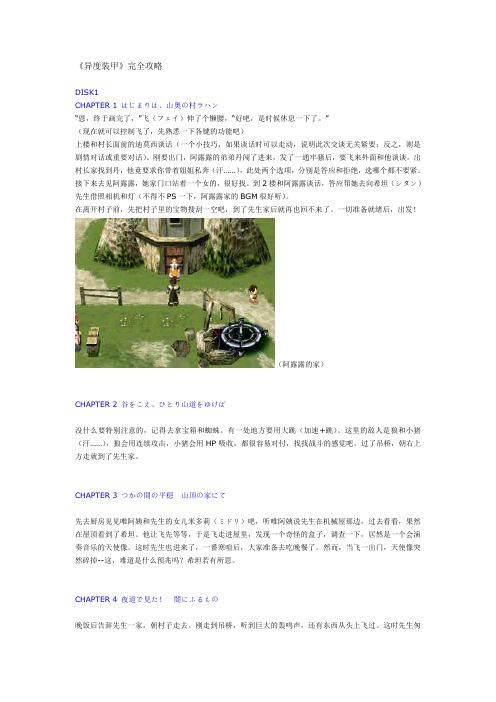
《异度装甲》完全攻略DISK1CHAPTER 1 はじまりは、山奥の村ラハン“恩,终于画完了,”飞(フェイ)伸了个懒腰,“好吧,是时候休息一下了。
”(现在就可以控制飞了,先熟悉一下各键的功能吧)上楼和村长面前的迪莫西谈话(一个小技巧,如果谈话时可以走动,说明此次交谈无关紧要;反之,则是剧情对话或重要对话)。
刚要出门,阿露露的弟弟丹闯了进来,发了一通牢骚后,要飞来外面和他谈谈。
出村长家找到丹,他竟要求你带着姐姐私奔(汗……),此处两个选项,分别是答应和拒绝,选哪个都不要紧。
接下来去见阿露露,她家门口站着一个女的,很好找。
到2楼和阿露露谈话,答应帮她去向希坦(シタン)先生借照相机和灯(不得不PS一下,阿露露家的BGM很好听)。
在离开村子前,先把村子里的宝物搜刮一空吧,到了先生家后就再也回不来了。
一切准备就绪后,出发!(阿露露的家)CHAPTER 2 谷をこえ、ひとり山道をゆけば没什么要特别注意的,记得去拿宝箱和蜘蛛。
有一处地方要用大跳(加速+跳)。
这里的敌人是狼和小猪(汗……),狼会用连续攻击,小猪会用HP吸收,都很容易对付,找找战斗的感觉吧。
过了吊桥,朝右上方走就到了先生家。
CHAPTER 3 つかの間の平穏山頂の家にて先去厨房见见唯阿姨和先生的女儿米多莉(ミドリ)吧,听唯阿姨说先生在机械屋那边,过去看看,果然在屋顶看到了希坦。
他让飞先等等,于是飞走进屋里,发现一个奇怪的盒子,调查一下,居然是一个会演奏音乐的天使像。
这时先生也进来了,一番寒喧后,大家准备去吃晚餐了。
然而,当飞一出门,天使像突然碎掉--这,难道是什么预兆吗?希坦若有所思。
CHAPTER 4 夜道で見た!闇にふるもの晚饭后告辞先生一家,朝村子走去。
刚走到吊桥,听到巨大的轰鸣声,还有东西从头上飞过。
这时先生匆匆赶到,据他说这是邻国基斯雷夫的机甲群。
正说着,从ラハン村方向传来了爆炸声!两人急忙赶去……村里要打一场机甲战,对手是2架ムシャ百式,HP只有150左右,想输都难。
The_Tell-Tale_Heart
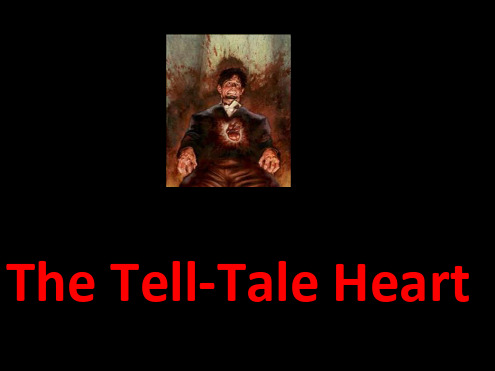
5. ___________________________
共七十一页
2. List 5 events, occasions, things that scare you.
• 《安娜贝尔·李》(Annabel Lee)
共七十一页
共七十一页
The Three Major Themes
共七十一页
共七十一页
He was the first well-known American writer to try to earn a living through writing alone, resulting in a financially difficult life and career.
共七十一页
1.2 Lead-in questions
• Can you tell us the most ghastly news that happened in your live?
• What will you do if a stranger creep into your chamber ?
• How can we protect ourselves from being hurt by the criminals or abnormal man ?
共七十一页
2.2 Edgar Allan Poe
共七十一页
共七十一页
Major works
• 长篇小说 • 《阿瑟·戈登·皮姆的故事》The Narrative of Arthur Gordon Pym)
The Tell-Tale Heart 泄密的心
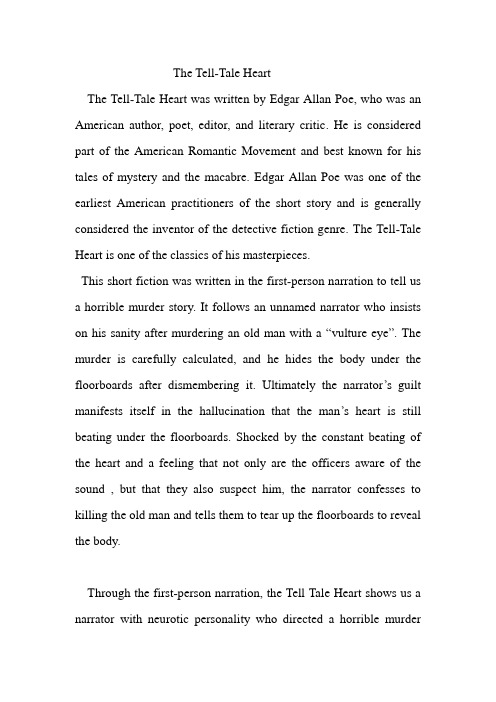
The Tell-Tale HeartThe Tell-Tale Heart was written by Edgar Allan Poe, who was an American author, poet, editor, and literary critic. He is considered part of the American Romantic Movement and best known for his tales of mystery and the macabre. Edgar Allan Poe was one of the earliest American practitioners of the short story and is generally considered the inventor of the detective fiction genre. The Tell-Tale Heart is one of the classics of his masterpieces.This short fiction was written in the first-person narration to tell us a horrible murder story. It follows an unnamed narrator who insists on his sanity after murdering an old man with a “vulture eye”. The murder is carefully calculated, and he hides the body under the floorboards after dismembering it. Ultimately the narrator’s guilt manifests itself in the hallucination that the man’s heart is still beating under the floorboards. Shocked by the constant beating of the heart and a feeling that not only are the officers aware of the sound , but that they also suspect him, the narrator confesses to killing the old man and tells them to tear up the floorboards to reveal the body.Through the first-person narration, the Tell Tale Heart shows us a narrator with neurotic personality who directed a horrible murderstory. After the first reading, I can hardly get any theme except an obvious one, it is the guilt or the guilty conscience that drives someone insane and he cannot get them away. Come back to the story, after the narrator cleaned up the spot, he failed to leave because of the officers’arrival. Anyhow, he pretended to be calm and showed them around.But his fear exposed very soon. He felt himself getting pale and wished them gone. He began to feel fear in his subconscious. Later he even heard the heartbeat of the old man, and the sound was getting louder and louder. How can a dead man have such a loud sound of heartbeat? His guilty and fear cause a hallucination to him. He did consider there was a heartbeat. Hence, he speaks louder so as to cover the sound, worrying about that the officers would also catch the sound. Unfortunately, the officers did not leave as he wished and the sound seemed to be louder. All these made him crazy. He even thought the officers had already found that he was the murderer. Finally, his fear, guilty destroyed him. Indeed, the heartbeat did not exist. But he just could not beat his guilty conscience and took the bill for his crime.The Tell Tale Heart is a great work, what its theme is more than this. If you have a careful read, you will find two details that cannot be ignored. One is the old man’s eye that is the reason why thenarrator killed the old man. The other is the heartbeat that is the reason why the narrator suffered retaliation. The word “eye” repeats eleven times while the word “heartbeat” repeats 8 times in the novel. In fact, these two words are the very point of this fiction. Imagine, how ridiculous to kill a man not for his riches or unkind but for a vulture - a pale blue eye, with a film over it. How ridiculous that a dead man still has heartbeat, and even, the description of the sound, which uses the sentence like “louder and louder”, appears 13times. Whether Allen is on purpose or not, the description of these two images are meaningful and shocking.The description of vulture-eye is deserved to be concentrated. Vulture is a raptor. We can see it as a symbol. It represents the power. Its evil or its strength may be the real reason that the narrator love it but against it at the same time. Now return to the story, the strong power dissatisfied the narrator, so he wanted to kill it. However, the power cannot be destroyed, just like the heartbeat which never stops. As a result, the narrator had suffered retaliation.I judge him as a person who has the neurotic personality, because he said he desired his eyes and di dn’t care about his treasures. He killed an old man just because the old man’s vulture eyes. The poor old man didn’t have some annoying behavior or some words can make the narrator really mad. This motive for murder is very ridiculousand seems unreasonable.I like this fiction. This description is a little exaggeration but it makes me notice the madman’s carefulness and cautiousness. The narrator brought me into the scene and makes the story effective for me by his attractive and extraordinary language. In addition, his description is full of the details of the crime and filled with his own feelings and these made me felt very nervous while reading this novel. You may read it someday and it won’t make you disappointed.。
文体学案例 《泄密的心》

The Tell-Tale HeartBy: Edgar Allan PoeMotto: Art is long and Time is fleetingAnd our hearts, though stout and braveStill, like muffled drums, are beatingFuneral marches to the grave.——LONGFELLOW TRUE!- nervous - very,very dreadfully nervous I had been and am;but why will you say that I am mad?The disease had sharpened my senses - not destroyed - not dulled them. Above all was the sense of hearing acute. I heard all things in the heaven and in the earth. I heard many things in hell. How,then,am I mad?Hearken!and observe how healthily - how calmly I can tell you the whole story.It is impossible to say how first the idea entered my brain;but once conceived,it haunted me day and night. Object there was none. Passion there was none. I loved the old man. He had never wronged me. He had never given me insult. For his gold I had no desire. I think it was his eye!yes,it was this!He had the eye of a vulture - a pale blue eye,with a film over it. Whenever it fell upon me,my blood ran cold;and so by degrees - very gradually - I made up my mind to take the life of the old man,and thus rid myself of the eye forever.Now this is the point. You fancy me mad. Madmen know nothing. But you should have seen me. You should have seen how wisely I proceeded - with what caution - with what foresight - with what dissimulation I went to work!I was never kinder to the old man than during the whole week before I killed him. And every night,about midnight,I turned the latch of his door and opened it - oh so gently!And then,when I had made an opening sufficient for my head,I put in a dark lantern,all closed,closed,that no light shone out,and then I thrust in my head. Oh,you would have laughed to see how cunningly I thrust it in!I moved it slowly - very,very slowly,so that I might not disturb the old man's sleep. It took me an hour to place my whole head within the opening so far that I could see him as he lay upon his bed. Ha!would a madman have been so wise as this,And then,when my head was well in the room,I undid the lantern cautiously-oh,so cautiously - cautiously (for the hinges creaked)- I undid it just so much that a single thin ray fell upon the vulture eye. And this I did for seven long nights - every night just at midnight - but I found the eye always closed;and so it was impossible to do the work;for it was not the old man who vexed me,but his Evil Eye. And every morning,when the day broke,I went boldly into the chamber,and spoke courageously to him,calling him by name in a hearty tone,and inquiring how he has passed the night. So you see he would have been a very profound old man,indeed,to suspect that every night,just at twelve,I looked in upon him while he slept.Upon the eighth night I was more than usually cautious in opening the door. A watch's minute hand moves more quickly than did mine. Never before that night had I felt the extent of my own powers - of my sagacity. I could scarcely contain my feelings of triumph. To think that there I was,opening the door,little by little,and he not even to dream of my secret deeds or thoughts. I fairly chuckled at the idea;and perhaps he heard me;for he moved on the bed suddenly,as if startled. Now you may think that I drew back - but no. His room was as black as pitch with the thick darkness,(for the shutters were close fastened,through fear of robbers,)and so I knew that he could not see the opening of the door,and I kept pushing it on steadily,steadily.I had my head in,and was about to open the lantern,when my thumb slipped upon the tin fastening,and the old man sprang up in bed,crying out - “Who's there?”I kept quite still and said nothing. For a whole hour I did not move a muscle,and in the meantime I did not hear him lie down. He was still sitting up in the bed listening;- just as I have done,night after night,hearkening to the death watches in the wall.Presently I heard a slight groan,and I knew it was the groan of mortal terror. It was not a groan of pain or of grief - oh,no!- it was the low stifled sound that arises from the bottom of the soul when overcharged with awe. I knew the sound well. Many a night,just at midnight,when all the world slept,it has welled up from my own bosom,deepening,with its dreadful echo,the terrors that distracted me. I say I knew it well. I knew what the old man felt,and pitied him,although I chuckled at heart. I knew that he had been lying awake ever since the first slight noise,when he had turned in the bed. His fears had been ever since growing upon him. He had been trying to fancy them causeless,but could not. He had been saying to himself - “It is nothing but the wind in the chimney - it is only a mouse crossing the floor,” or “It is merely a cricket which has made a single chirp.” Yes,he had been trying to comfort himself with these suppositions:but he had found all in vain. All in vain;because Death,in approaching him had stalked with his black shadow before him,and enveloped the victim. And it was the mournful influence of the unperceived shadow that caused him to feel - although he neither saw nor heard - to feel the presence of my head within the room.When I had waited a long time,very patiently,without hearing him lie down,I resolved to open a little - a very,very little crevice in the lantern. So I opened it - you cannot imagine how stealthily,stealthily - until,at length a simple dim ray,like the thread of the spider,shot from out the crevice and fell full upon the vulture eye.It was open - wide,wide open - and I grew furious as I gazed upon it. I saw it with perfect distinctness - all a dull blue,with a hideous veil over it that chilled the very marrow in my bones;but I could see nothing else of the old man's face or person:for I had directed the ray as if by instinct,precisely upon the damned spot.And have I not told you that what you mistake for madness is but over-acuteness of the sense?- now,I say,there came to my ears a low,dull,quick sound,such as a watch makes when enveloped in cotton. I knew that sound well,too. It was the beating of the old man's heart. It increased my fury,as the beating of a drum stimulates the soldier into courage.But even yet I refrained and kept still. I scarcely breathed. I held the lantern motionless. I tried how steadily I could maintain the ray upon the eve. Meantime the hellish tattoo of the heart increased. It grew quicker and quicker,and louder and louder every instant. The old man's terror must have been extreme!It grew louder,I say,louder every moment!- do you mark me well I have told you that I am nervous:so I am. And now at the dead hour of the night,amid the dreadful silence of that old house,so strange a noise as this excited me to uncontrollable terror. Yet,for some minutes longer I refrained and stood still. But the beating grew louder,louder!I thought the heart must burst. And now a new anxiety seized me - the sound would be heard by a neighbour!The old man's hour had come!With a loud yell,I threw open the lantern and leaped into the room. He shrieked once - once only. In an instant I dragged him to the floor,and pulled the heavy bed over him. I then smiled gaily,to find the deed so far done. But,for many minutes,the heart beat on with a muffled sound. This,however,did not vex me;it would not be heard through the wall. At length it ceased. The old man was dead. I removed the bed and examined thecorpse. Yes,he was stone,stone dead. I placed my hand upon the heart and held it there many minutes. There was no pulsation. He was stone dead. His eve would trouble me no more.If still you think me mad,you will think so no longer when I describe the wise precautions I took for the concealment of the body. The night waned,and I worked hastily,but in silence. First of all I dismembered the corpse. I cut off the head and the arms and the legs.I then took up three planks from the flooring of the chamber,and deposited all between the scantlings. I then replaced the boards so cleverly,so cunningly,that no human eye - not even his - could have detected any thing wrong. There was nothing to wash out - no stain of any kind - no blood-spot whatever. I had been too wary for that. A tub had caught all - ha!ha!When I had made an end of these labors,it was four o'clock - still dark as midnight. As the bell sounded the hour,there came a knocking at the street door. I went down to open it with a light heart,- for what had I now to fear?There entered three men,who introduced themselves,with perfect suavity,as officers of the police. A shriek had been heard by a neighbour during the night;suspicion of foul play had been aroused;information had been lodged at the police office,and they (the officers)had been deputed to search the premises.I smiled,- for what had I to fear?I bade the gentlemen welcome. The shriek,I said,was my own in a dream. The old man,I mentioned,was absent in the country. I took my visitors all over the house. I bade them search - search well. I led them,at length,to his chamber. I showed them his treasures,secure,undisturbed. In the enthusiasm of my confidence,I brought chairs into the room,and desired them here to rest from their fatigues,while I myself,in the wild audacity of my perfect triumph,placed my own seat upon the very spot beneath which reposed the corpse of the victim.The officers were satisfied. My manner had convinced them. I was singularly at ease. They sat,and while I answered cheerily,they chatted of familiar things. But,ere long,I felt myself getting pale and wished them gone. My head ached,and I fancied a ringing in my ears:but still they sat and still chatted. The ringing became more distinct:- It continued and became more distinct:I talked more freely to get rid of the feeling:but it continued and gained definiteness - until,at length,I found that the noise was not within my ears.No doubt I now grew very pale;- but I talked more fluently,and with a heightened voice. Yet the sound increased - and what could I do?It was a low,dull,quick sound - much such a sound as a watch makes when enveloped in cotton. I gasped for breath - and yet the officers heard it not. I talked more quickly - more vehemently;but the noise steadily increased. I arose and argued about trifles,in a high key and with violent gesticulations;but the noise steadily increased. Why would they not be gone?I paced the floor to and from with heavy strides,as if excited to fury by the observations of the men - but the noise steadily increased. Oh God!what could I do?I foamed - I raved - I swore!I swung the chair upon which I had been sitting,and grated it upon the boards,but the noise arose over all and continually increased. It grew louder - louder - louder!And still the men chatted pleasantly,and smiled. Was it possible they heard not?Almighty God!- no,no!They heard!- they suspected!- they knew!- they were making a mockery of my horror!-this I thought,and this I think. But anything was better than this agony!Anything was more tolerable than this derision!I could bear those hypocritical smiles no longer!I felt that I must scream or die!and now - again!- hark!louder!louder!louder!louder!“Villains!” I shrieked,“dissemble no mor e!I admit the deed!- tear up the planks!here,here!- It is the beating of his hideous heart!”。
巨人捕手杰克 双英字幕台词
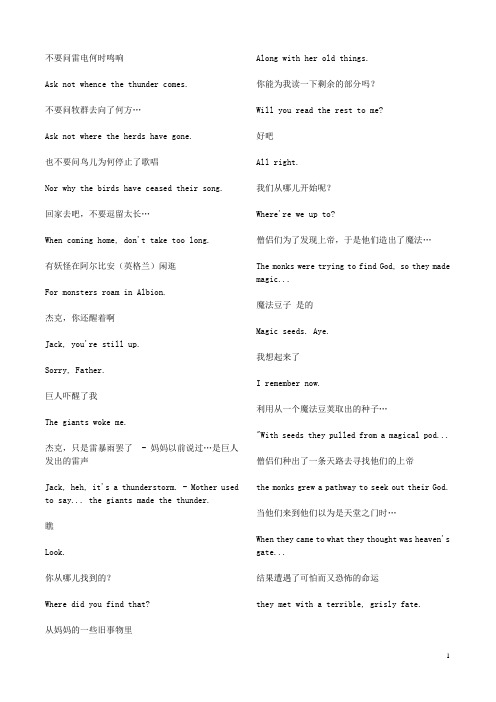
不要问雷电何时鸣响Ask not whence the thunder comes.不要问牧群去向了何方…Ask not where the herds have gone.也不要问鸟儿为何停止了歌唱Nor why the birds have ceased their song.回家去吧,不要逗留太长…When coming home, don't take too long.有妖怪在阿尔比安(英格兰)闲逛For monsters roam in Albion.杰克,你还醒着啊Jack, you're still up.Sorry, Father.巨人吓醒了我The giants woke me.杰克,只是雷暴雨罢了 - 妈妈以前说过…是巨人发出的雷声Jack, heh, it's a thunderstorm. - Mother used to say... the giants made the thunder.瞧Look.你从哪儿找到的?Where did you find that?从妈妈的一些旧事物里Along with her old things.你能为我读一下剩余的部分吗?Will you read the rest to me?好吧All right.我们从哪儿开始呢?Where're we up to?僧侣们为了发现上帝,于是他们造出了魔法…The monks were trying to find God, so they made magic...魔法豆子是的Magic seeds. Aye.我想起来了I remember now.利用从一个魔法豆荚取出的种子…"With seeds they pulled from a magical pod...僧侣们种出了一条天路去寻找他们的上帝the monks grew a pathway to seek out their God.当他们来到他们以为是天堂之门时…When they came to what they thought was heaven's gate...结果遭遇了可怕而又恐怖的命运they met with a terrible, grisly fate.在天堂和凡间之间是一个…可怕的地方For between heaven and earth was a... perilous place.甘图瓦,残忍的巨人族的领地Gantua, home to a fierce giant race.因为在它们面前有一座桥通向人类世界…With a bridge now before them to the world of men...巨人族把灾难带了下来a plague of giants descends.从最富有国王那里得到一个启示…Taking a cue from the richest of kings...它们通过掠夺东西尝到了甜头…they acquired a taste for acquiring things.但是有一种甜头让它们完全失控了But the one taste that caused them to lose all control"这个甜头来自于人类…血液、骨头和所有的部分"Was a taste for the mankind... blood, bones and all.真让人恶心Well, that's revolting.太可怕了是吗,伊莎贝尔?Too scary, Isabelle? Giants aren't scary.甚至它们的恐怖首领也不可怕吗,一个怪异巨人有两个头颅Not even their terrifying leader, a monstrous giant with two heads?读下去,妈妈只是个故事而已Keep reading, Mother. It's just a story.是吗?Is it?国王艾瑞克…吩咐僧侣们返回到黑魔法中…寻找某种方法来控制巨人的心灵"King Erik bade the monks return to dark arts to find some way to rule giant hearts.于是他们融化了一个豆子…So they melted one down...混入很多的魔法…mixed in magic and more...打造出了一个前所未有的王冠and they crafted a crown unlike any before."国王艾瑞克的魔法王冠King Erik's magic crown.这是我最喜欢的章节This is my favorite part.只要国王把王冠拿在手中…"As soon as the king took the crown in hand...巨人们就成了奴隶…服从他的所有命令the giants were slave... to his every command.国王把巨人们送回了它们出生的地方He sent them back to the place of their birth.它们在天堂与凡间之间的家成了一座监狱Their home now a prison between heaven and earth.艾瑞克切断了巨人族和人类之间的连接Erik severed the link between giants and men."和平再次回到了他的国土"And peace returned to his kingdom again.这个神秘的圣物…被完整保留下来The mystical relics were all that remained.在艾瑞克统治的年代里一直安然无恙safe with Erik through the years that he reigned.当到了国王艾瑞克最终要长眠的时刻…And when time came at last for King Erik to sleep...他带走了王冠并留在他身边…为了永久的保管he took crown and seed with him... for permanent keep."随着这位国王的尸骨最终化为灰烬…"And as the king's bones slowly crumbled away... 真相成了传奇truth became legend."或许人们会说Or so people say.当巨人回来了怎么办呢?What will happen when the giants come back?它们不会的,儿子They won't, son.但假如它们回来了呢? - 杰克But what if they do? - Jack.我估计国王的侍卫会把它们切成两段Well, I guess the king's Guardians will have to cut them down to size.我要当守护人I wanna be a Guardian.你有那种精神毫无疑问的You have the spirit. No doubt about that.国王的侍卫必须生来具有高贵的血统The king's Guardians must be born of noble blood.那不是在咱们这种老百姓当中的There's not much in ours but dirt and sweat.只是个故事,杰克It's only a story, Jack.巨人不是真的Giants aren't real.但是国王艾瑞克是真的But King Erik was real.他是He was.某种意义上说,他一直是存在的In some ways, he still is.你就是他的后裔 - 我知道他埋在哪里- You're of his blood. - I've seen where he's buried.在皇室陵园?听起来你好象已经亲自做过一些探险In the royal catacombs? Sounds like you've been having some adventures of your own.我遇到麻烦了吗? - 当然没有Am I in trouble? - Not at all.我想让你去经历一番I want you to have adventures.我们让你成为更好的皇后 - 你要怎么做?It'll make you a better queen. - How?因为你将会看到这个世界是如何运作的Because you'll get to see how the world works. 当你成为了皇后你就有能力让这个世界变得更好you'll have the power to make the world a better place.现在闭上眼睛睡觉吧。
Edgar Allan Poe(1809—1849)埃德加 爱伦坡

His style
1) He was good at generalizing. 2) His style was traditional. 3) He insisted on an even metrical flow in versification.
His position
Poe’s position in world literature is secure. His influence is world-wide in modern literature. His aesthetics and conscious craftsmanship, his attack on “the heresy of the didactic” and his call for “the rhythmical creation of beauty” have influenced French symbolism and the devotees of “art for art’s sake”. Poe is father of many things, one of which is psychoanalytic criticism, the other being the detective story.
ANNABEL LEE
It was many and many a year ago, In a kingdom by the sea, That a maiden there lived whom you may know By the name of ANNABEL LEE; And this maiden she lived with no other thought Than to love and be loved by me. I was a child and she was a child, In this kingdom by the sea; But we loved with a love that was more than loveI and my Annabel Lee; With a love that the winged seraphs of heaven Coveted her and me.
Edgar Allan Poe(1809—1849)埃德加 爱伦坡

His position
Poe‘s position in world literature is secure. His influence is world-wide in modern literature. His aesthetics and conscious craftsmanship, his attack on ―the heresy(异端,异教) of the didactic(说 教的)” and his call for ―the rhythmical(有韵律 的) creation of beauty‖ have influenced French symbolism and the devotees of ―art for art‘s sake‖. Poe is father of many things, one of which is psychoanalytic criticism, the other being the detective story.
Edgar Allan Poe 坡 (1809—1849)
E.A. Poe (1809—1849)
Poe’s mother
Edgar Allan Poe
(1809—1849)埃德加.爱伦.坡
• • • • • •
Part Part Part Part Part Part
I. Life Experience II Literary Position III. Major Works IV. Point of View V. Style VI. Appreciation
Edgar Allan Poe
• Poe‘s literary contribution
– Aestheticism
The tell-tale heart 泄密的心

1.Why?
the old man with a clouded, pale, blue "vulture-like" eye
‘He had never wronged me.’ ‘For his gold I had no desire.’
2. Seven days’ observation (Para 3)
Confident that no one could detected anything wrong, he led them to the old man’s room while himself placed his own seat on the very spot beneath the corpse.
After killing the old man (Para 14-18)
A neighbor heard the scream and reported to the police. He welcomed round, and explained that the scream was his own in a dream while the old man was absent in the country.
原创力文档是网络服务平台方若您的权利被侵害侵权客服qq
By Shenjia / Chen Xiaomin /Guo Wenting
Plot summary
Point
of view
3
major parts
Point of view
The author writes in the first person. The narrator, in this particular story, continually stresses that he is not mad, and tries to convince us of that by describes how carefully this cruel crime was planned and executed making the story even horrible.
《泄密的心》的非理性叙事
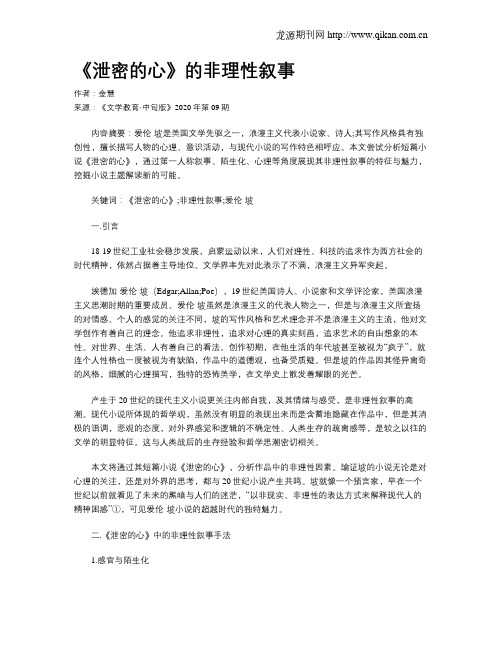
《泄密的心》的非理性叙事作者:金慧来源:《文学教育·中旬版》2020年第09期内容摘要:爱伦·坡是美国文学先驱之一,浪漫主义代表小说家、诗人;其写作风格具有独创性,擅长描写人物的心理、意识活动,与现代小说的写作特色相呼应。
本文尝试分析短篇小说《泄密的心》,通过第一人称叙事、陌生化、心理等角度展现其非理性叙事的特征与魅力,挖掘小说主题解读新的可能。
关键词:《泄密的心》;非理性叙事;爱伦·坡一.引言18-19世纪工业社会稳步发展,启蒙运动以来,人们对理性、科技的追求作为西方社会的时代精神,依然占据着主导地位。
文学界率先对此表示了不满,浪漫主义异军突起。
埃德加·爱伦·坡(Edgar;Allan;Poe),19世纪美国诗人、小说家和文学评论家,美国浪漫主义思潮时期的重要成员。
爱伦·坡虽然是浪漫主义的代表人物之一,但是与浪漫主义所宣扬的对情感、个人的感觉的关注不同,坡的写作风格和艺术理念并不是浪漫主义的主流,他对文学创作有着自己的理念。
他追求非理性,追求对心理的真实刻画,追求艺术的自由想象的本性。
对世界、生活、人有着自己的看法。
创作初期,在他生活的年代坡甚至被视为“疯子”,就连个人性格也一度被视为有缺陷,作品中的道德观,也备受质疑。
但是坡的作品因其怪异离奇的风格,细腻的心理描写,独特的恐怖美学,在文学史上散发着耀眼的光芒。
产生于20世纪的现代主义小说更关注内部自我,及其情绪与感受,是非理性叙事的高潮。
现代小说所体现的哲学观,虽然没有明显的表现出来而是含蓄地隐藏在作品中,但是其消极的语调,悲观的态度,对外界感觉和逻辑的不确定性、人类生存的疏离感等,是较之以往的文学的明显特征。
这与人类战后的生存经验和哲学思潮密切相关。
本文将通过其短篇小说《泄密的心》,分析作品中的非理性因素。
論证坡的小说无论是对心理的关注,还是对外界的思考,都与20世纪小说产生共鸣。
短篇小说《泄密的心》功能文体分析

分类号:H0 学校代码: 10590 U D C: 密 级: 公开 学 号:20041209深圳大学硕士学位论文短篇小说《泄密的心》功能文体分析A Functional Stylistic Approach to the Short Story“The Tell-Tale Heart”符章琼学科门类:文学专业名称:外国语言学及应用语言学学院(系所):外国语学院指导教师:刘英凯教授王瑾博士AbstractStylistics has developed into different schools together with the development of contemporary linguistics. The present thesis bases itself on the theories and methods of the functional stylistics to undertake a stylistic analysis of the short story “The Tell-Tale Heart” written by Edgar Allan Poe.“The Tell-Tale Heart” is simultaneously a horror story and a psychological thriller told from a first-person perspective. From a functional perspective and taking as its theoretical foundation the principles of the three metafuncitons, the tripartite contextual variables, and the foregrounding theory of functionalism, the present thesis examines how exactly the prominent linguistic features of the story contribute to the construction of its theme and the horrible atmosphere in it.The thesis begins with an introduction of different stylistic schools and a review of previous studies on functional stylistics; then it clarifies some basic issues of the present study and establishes the theoretical framework for the thesis. In the detailed stylistic analyses of the short story are involved both qualitative and quantitative methods. The author of the thesis first identifies the stylistic features from four different aspects respectively (i.e. phonology and the three metafuncitons), then exhibits the relationship between the prominent linguistic features, the theme of the story, and the horrible effects of the story, showing how the writer of the story achieves his intention to create the horrible atmosphere in the setting and to strengthen the horrible impact on the reader through his choices of language patterns on different language levels. These analyses associate the prominent linguistic features with the topic of the story and the context of the text, to identify the stylistic features which function in exhibiting and enhancing the theme of the story.This study is one of the initial attempts to undertake a functional stylistic analysis of psychological thrillers. It thus expands the application of the functional linguistic theory and also proves the applicability of the functional linguistic theory in analyzing this new type of literary works.Key words: “The Tell-Tale Heart”; style; functional stylistics; prominence; situationii摘要随着现代语言学理论的发展,研究语言特点的文体学形成了许多不同学派。
“目的论”视角下爱伦·坡厌恶鹰眼之探析——以《泄密的心》为例
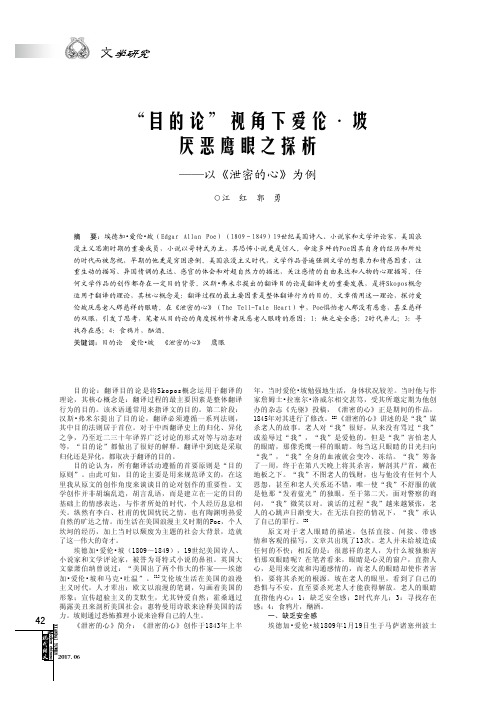
文“目的论”视角下爱伦·坡厌恶鹰眼之探析○江 红 郭 勇摘 要:埃德加•爱伦•坡(Edgar Allan Poe)(1809~1849)19世纪美国诗人、小说家和文学评论家,美国浪漫主义思潮时期的重要成员,小说以哥特式为主,其恐怖小说更是惊人。
命途多舛的Poe因其自身的经历和所处的时代而被忽视,早期的他更是穷困潦倒。
美国浪漫主义时代,文学作品普遍强调文学的想象力和情感因素,注重生动的描写、异国情调的表达、感官的体会和对超自然力的描述,关注感情的自由表达和人物的心理描写。
任何文学作品的创作都存在一定目的背景。
汉斯•弗米尔提出的翻译目的论是翻译史的重要发展,是将Skopos概念运用于翻译的理论,其核心概念是:翻译过程的最主要因素是整体翻译行为的目的。
文章借用这一理论,探讨爱伦坡厌恶老人那慈祥的眼睛。
在《泄密的心》(The Tell-Tale Heart)中,Poe惧怕老人那没有恶意,甚至慈祥的双眼,引发了思考,笔者从目的论的角度探析作者厌恶老人眼睛的原因:1:缺乏安全感;2时代弃儿;3:寻找存在感;4:食鸦片,酗酒。
关键词:目的论 爱伦•坡 《泄密的心》 鹰眼目的论:翻译目的论是将Skopos概念运用于翻译的理论,其核心概念是:翻译过程的最主要因素是整体翻译行为的目的。
该术语通常用来指译文的目的。
第二阶段:汉斯•弗米尔提出了目的论,翻译必须遵循一系列法则,其中目的法则居于首位。
对于中西翻译史上的归化、异化之争,乃至近二三十年译界广泛讨论的形式对等与动态对等,“目的论”都做出了很好的解释。
翻译中到底是采取归化还是异化,都取决于翻译的目的。
目的论认为,所有翻译活动遵循的首要原则是“目的原则”。
由此可知,目的论主要是用来规范译文的,在这里我从原文的创作角度来谈谈目的论对创作的重要性。
文学创作并非胡编乱造,胡言乱语,而是建立在一定的目的基础上的情感表达,与作者所处的时代,个人经历息息相关。
纵然有李白、杜甫的忧国忧民之情,也有陶渊明热爱自然的旷达之情。
爱伦坡《泄密的心》分析

The narrator in “The Tell-Tale Heart”This short fiction uses the first-person narration to tell us a horrible murder story. The narrator in the fiction is an unnamed killer who murdered the old man. While reading this fiction, I considered that this narrator is a good storyteller.But in my opinion, he is an unreliable narrator and his not persuasive. “Here, here! --It is the beating of his hideous heart! ()" The narrator yelled in the end. How can a dead person have such a loud sound of heart beat? Obviously he is totally mad and only controlled by his fantasy. There are many descriptions out of reality except this one, so I think he is not a reliable narrator and his language is attractive but not persuasive.I think the narrator has a neurotic personality, and he is a cruel psychopath. At the very beginning of the story, he said, “True! —nervous—very, very dreadfully nervous I had been and am; but why will you say that I am mad?”(). This sentence makes me uncomfortable, because such a weird atmosphere surrounds me and I don’t know what the mad narrator is going to do. I judge him as a person who has the neurotic personality, because he said he desired his eyes and didn’t care about his treasures (). He killed an old man just because the old man’s vulture eyes. The poor old man didn’t have some annoying behavior or some words can make the narrator really mad. This motive for murder is very ridiculous and seems unreasonable, and this makes contribution to let me verify that the narrator is a psychopath. It can’t be denied that he is a very careful killer. While walking into the old man’s room at the eighth night, he opened the lantern extremely careful and said “you cannot imagine how stealthily,stealthily -- until at length a single dim ray like the thread of the spider shot out from the crevice and fell upon the vulture eye.”(). Exaggeration this description is, but it makes me notice the madman’s carefulness and cautiousness.The narrator brought me into the scene and makes the story effective for me by his attractive and extraordinary language. In addition, his description is full of the details of the crime and filled with his own feelings and these made me felt very nervous while reading this novel. The narrator killed the old man with a strange motive, so I am wondering how his eyes made the narrator mad. Another question is, the narrator didn’t felt a little guilty and even have a pleasure after the murder, why his sense of guilt became so strong in the end? I think this can help me know more about the narrator.。
爱伦· 坡及他的心理恐怖作品
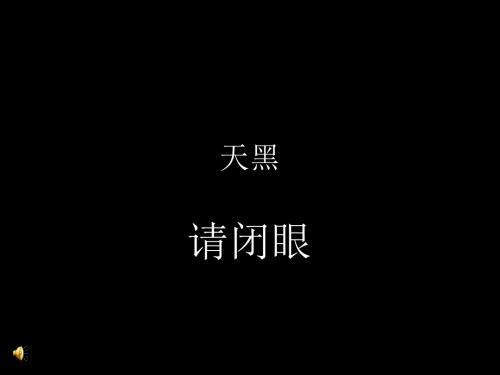
《乌鸦》启示
1、乌鸦那阴郁的警告一遍又一遍: 所有的一切终将消散在“永不复还”的遗忘之中。 2、人之至爱的一切不正像乌鸦聒噪的那样, 一旦逝去便永不 复生吗? 3、爱伦坡已经离我们而去,正如那个属于他的时代一样,永不 复生。
《黑猫》启示
文章最后为恶者终于受到惩 罚,但是道德宣讲从来不是爱 伦· 坡的爱好。这篇文章,作者 更想表达的是一种紧张恐慌的气 氛,一种精确有张力的精神分析, 一种文字的快感及美感。 但对 于读者,或许还是得到了一些道 德上的启示。
《黑猫》赏析
1、寂静的黑夜、潮湿幽森的地下室和富含深意的动物,这都 是爱伦坡小说中常见的形象,在《黑猫》中爱伦坡再次成功 运用这些元素。坡以恐怖小说闻名,但是在《黑猫》中, 他模糊了现实与超自然的界限。超自然现象、化身、再生、 恐怖、神秘,全在这个故事里,或许还有更多。
爱伦· 坡的命运有点类似梵高,一生潦倒,凄凉苦楚。死 后若干年后才受到尊崇,可诗人早已在贫困孤苦中离去,只 有伟大作品长留无情的人间。 也许这是一个谁也无法否认的事实,天才注定要承受更多 的痛苦,因为他们生来就孤独。
Poe的作品特点
•
爱伦· 坡毕生致力于探寻人类心灵的隐秘,试探人类心 理的承受极限。美和死亡是爱伦坡文学创作的两大主题。 作品大都表现和探讨死亡和恐惧,调子阴郁悲伤,具独特 的美学风格。
《泄密的心》内容简介
• 这是一篇非常简洁的惊悚小 说。 • 一个年轻人因为厌恶隔壁老 人秃鹰般的灰蓝色眼睛,而 将他残忍杀害。他几乎要逃 脱了警察的盘问,但最后, 却还是由于忍受不了那在地 板下,还在跳动的心脏,他 在癫狂的状态下,承认了谋 杀真相。
《泄密的心》赏析
• 《泄密的心》是坡的纯心理小说,对一个 杀人犯的心理作了详尽、透彻的揭示。
泄密的心-读书报告Reading Report-作品作者爱伦坡【英文】

Reading Report: The Tell-Tale HeartI.Brief introduction of writer and storylineEdgar Allan Poe(1809-1849) was an American poet, novelist and literary critic in the 19th century, and also an important member of the American Romanticism. He was famous for mystery story and the horror fiction, revered as the fathers of mystery novels and science fiction novel. The Tell-Tale Heart was his early short novel, which used the murderer’s perspective to describe the process of commission of crime.In this novel, it portrays a nervous and psychopathic young man. Because his old neighbor has a vulture-like eye, he emerges a sickly hatred towards the old man. This hatred grows deeper and deeper, so he decides to kill him. However, in a dark night, the young man murdered the old man and dismembered the body, stuffing each piece of it into the floor. Faced the inquiry of police, the young people pretended to be imperturbable, cautious. And he boldly moved a chair and sat above the floor, where the old man’s body was hidden. Chatted with the police calmly, but after a while, the young man seemed to hear the old man’s heartbeat. This kind of voice became louder and louder, and the young man was going to crash. Finally, he admitted the fact that he had killed the old man.II.Main task and topic analysisThe novel of Edgar Allan Poe always portray enteral death as the theme. This novel was quiet difference with such sentimental death in romanticism and also with the sheer terror of death in the Gothic novel. His works are unique in his the brushwork of heavy and complicated. The most terrible part of the story is not the plot itself, but the crazy psychological description of the young people. The tension fills the whole story with terror and fear. The author has his own unique aesthetic, deathaesthetics. The full text uses a lot of details to depict the image of the characters, and the words and sentences used in the strange atmosphere are a bit of a unique beauty.III.The structure of novel and writing skillsRigorous thinking, the plot is interlinked. The Tell-Tale Heart uses a large number of first-person inner monologues and typical image-eyes to describe the theme of human nature. Through the inner changes of the protagonist, the development of the story is promoted, and the readers are guided to follow the criminal process and ideological changes of the protagonist, so as to feel the fear in his inner heart, so as to explore the ugliness and abnormal psychology in human nature.。
从荣格阴影理论分析《泄密的心》

从荣格阴影理论分析《泄密的心》发布时间:2021-12-24T08:39:40.566Z 来源:《中国教师》2021年8月第22期作者:马瑞[导读] 《泄密的心》是美国短篇小说大师爱伦·坡著名的哥特小说作品,从第一叙述视角讲述了一名强调自己精神正常的无名叙述者马瑞郑州财经学院河南郑州 450000摘要:《泄密的心》是美国短篇小说大师爱伦·坡著名的哥特小说作品,从第一叙述视角讲述了一名强调自己精神正常的无名叙述者因为一位老人的“鹰眼”而将其残忍谋杀并藏匿尸体的故事。
本文将借助荣格原型心理学中四大原型之一“阴影”对文中叙述者进行心理分析,并进一步探讨爱伦·坡如何通过这种“心理式恐怖”获得令人惊叹的阅读效果。
关键词:《泄密的心》;阴影;荣格;爱伦·坡一、引言卡尔·古斯塔夫·荣格(1875-1961),分析心理学创始者,创立了荣格人格分析心理学理论,主张把人格分为意识、个人无意识和集体无意识三层。
荣格分析心理学又衍生出原型心理学(Archetypal Psychology),提出原型(Archetypes)这一概念,将大多心理问题的形成一般归结为某一“原型”没有得到良好发展而受到阻碍,由此精神系统作出自我调整而表现为神经症或别的问题。
我们可以将原型理解为人类出生之前就预置的行为模式和想法。
荣格分析心理学中有四大原型:自性(Self)、阿尼玛(Anima)、阿尼马斯(Animus)和阴影(Shadow)。
本文将借助阴影原型对爱伦坡名作《泄密的心》进行分析。
《泄密的心》(The Tell-tale Heart)又译《告密的心》,是美国的短篇小说大师爱伦·坡(Edgar Allan Poe)于1843年所著的一篇经典的哥特小说作品。
故事讲述了一名强调自己精神正常的无名叙述者因为一位老人的“鹰眼”(vulture eye)而谋杀了他。
谋杀者有过仔细的计划,并且再肢解尸体后将其藏在地板下面。
泄密的心读后感
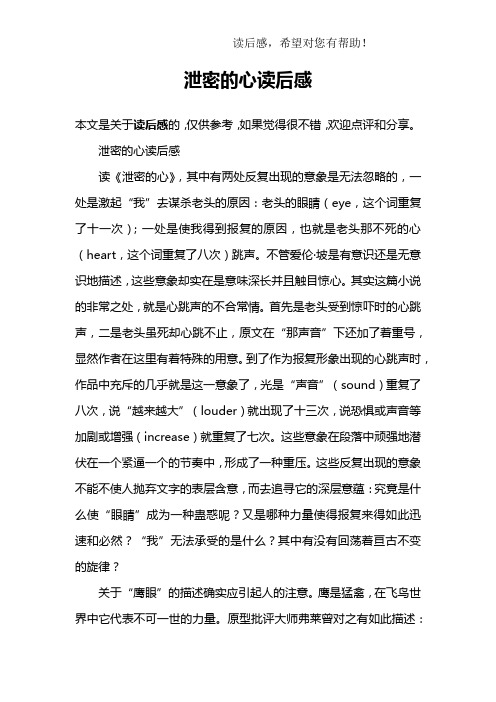
泄密的心读后感本文是关于读后感的,仅供参考,如果觉得很不错,欢迎点评和分享。
泄密的心读后感读《泄密的心》,其中有两处反复出现的意象是无法忽略的,一处是激起“我”去谋杀老头的原因:老头的眼睛(eye,这个词重复了十一次);一处是使我得到报复的原因,也就是老头那不死的心(heart,这个词重复了八次)跳声。
不管爱伦·坡是有意识还是无意识地描述,这些意象却实在是意味深长并且触目惊心。
其实这篇小说的非常之处,就是心跳声的不合常情。
首先是老头受到惊吓时的心跳声,二是老头虽死却心跳不止,原文在“那声音”下还加了着重号,显然作者在这里有着特殊的用意。
到了作为报复形象出现的心跳声时,作品中充斥的几乎就是这一意象了,光是“声音”(sound)重复了八次,说“越来越大”(louder)就出现了十三次,说恐惧或声音等加剧或增强(increase)就重复了七次。
这些意象在段落中顽强地潜伏在一个紧逼一个的节奏中,形成了一种重压。
这些反复出现的意象不能不使人抛弃文字的表层含意,而去追寻它的深层意蕴:究竟是什么使“眼睛”成为一种蛊惑呢?又是哪种力量使得报复来得如此迅速和必然?“我”无法承受的是什么?其中有没有回荡着亘古不变的旋律?关于“鹰眼”的描述确实应引起人的注意。
鹰是猛禽,在飞鸟世界中它代表不可一世的力量。
原型批评大师弗莱曾对之有如此描述:“动物世界以妖怪和猛兽等意象来描绘。
……所有的统治者都和怪兽等同。
”据此,我们有理由将鹰眼视为一种象征:它代表了权势。
它的邪-恶或者它的强大的力量正是“我”爱它又天然地反对它的真正原因。
这种心态是集体的、一般人类心理共有的。
再回到故事内容得以展开的结构,“我”不满于一种强权,想扼杀它,但却最终得到了强权的报复。
在原型批评理论中,这些貌似蔑视真理的现象却是原型的最直接的表现。
这时,《泄密的心》已经不再是一篇恐怖心理小说了。
它所表达的是西西弗斯式人类生存的某种困境:世界充满了违情悖理和徒劳无益。
泄密的心

善恶之战的最后结果是善战胜了恶,人类在反常心态的驱使下,有时会犯下不可挽回的罪行,而更多时候却是经受不住内心良心的谴责,又在这种矛盾、纠结的心态下去主动承认了自己曾犯下的恶的罪行。
在现实社会中,人类的心理也往往受这种反常心态的奴役,有时善战胜了恶,有时恶会战胜了善,很多人就在这善与恶的内心交战中走向了毁灭。
《泄密的心》作为爱伦·坡恐怖小说的代表作,其中的对人类心理阴暗面,以及人类内心深处的纠结与矛盾的反思更是其不朽的原因,这也正是爱伦·坡小说不同与他同时代的说教小说,独特创新之处。
《泄密的心》讲述的是一桩谋杀案。
“我”和老头住在一起,老头对我没有丝毫不好之处,我也很爱老头,但是我却无法忍受老头那双眼睛。
老头那双浅蓝色的眼睛在“我”这个神经极度敏感的人看来就像一双鹰眼,只要被这双眼睛瞧上一眼,我就浑身发毛。
“我”终于无法忍受老头的那双眼睛,策划杀掉老头,经过一个星期的准备及观察,在第八天晚上“我”闯进老头的房间将他杀害,将其尸首肢解,藏在地板之下,并把杀人现场清理干净。
杀人后的第二天清晨警察来调查案件,“我”若无其事的接受问话,并大胆的请他们坐下闲聊。
“我”在谈话过程中越来越紧张,仿佛听到了老头低沉的心跳声就在房间里回响,最后经受不住自己良心的谴责,无法自控,承认了自己的罪行。
.1“恶有恶报”的道德主题在《泄密的心》中,杀人者有着高超的犯罪智商,然而不管计划再谨慎周密,实施地多么天衣无缝,他最终还是露出了狐狸尾巴。
坡以微妙独特的方式在告诉人们一个非常简单的道德主题:恶有恶报。
小说中关于心跳的构思非常巧妙。
小说最后叙述者耳边越来越清晰的心跳声很有可能是叙述者自己的幻觉。
坡之所以选用心跳这一幻觉,是因为心跳是对一个人生命存在最好的证明。
叙述者耳边的心跳声实际上是在不断地提示他他谋杀了一个鲜活的生命,这种幻觉是叙述者潜意识里对自己良知的鞭挞和拷问,这是一股令人无法忽视和抗拒的强大力量,驱使恶人得到恶报。
泄密的心 the tell-tale heart
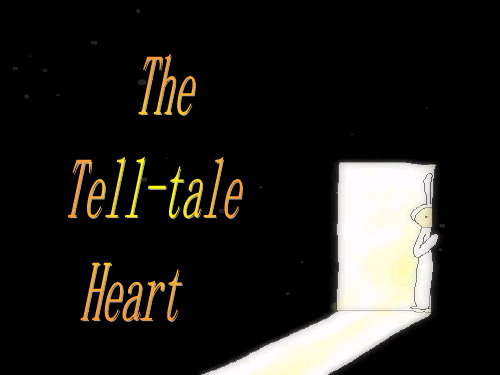
Point of View
2 The First point of view gives us an unforgettable experience to explore a world of a mad person. When we are reading, we are the person who want to finish the old man’s life. And we go through the whole process of murder.
setting
• Time: at the dead hour of night
• Place: in the old man’s room
plot
The man hided the dead old man and
every thing turned
back to be quiet.
ቤተ መጻሕፍቲ ባይዱ
When the terror of the old man
Point of View
Using first person point of view is one of the reasons why this passage so attractive and outstanding.
Point of View
1 The use of first person point of view put readers into the position to the killer who is a mad person without consciousness. It seems that everything the hero does in the story is chosen by ourselves. We also have the ability to hear all things in the heaven and in the earth. We hate the color of the old man’s eye.
《泄密的心》的存在主义解读
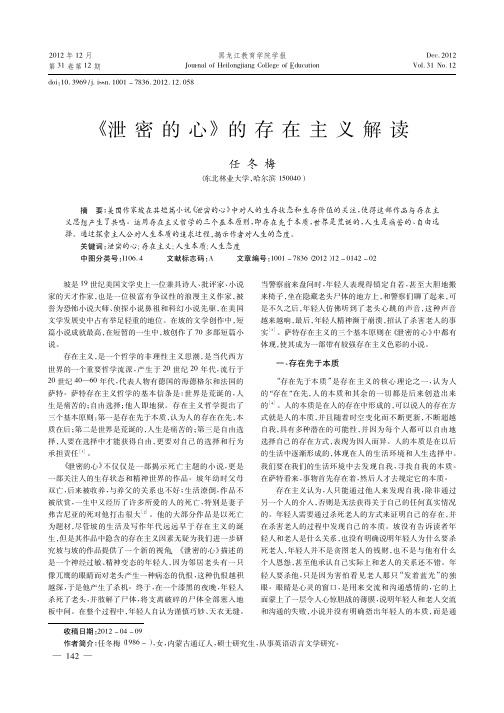
ቤተ መጻሕፍቲ ባይዱ
二、世界是荒诞的,人生是痛苦的
我们荒诞地 来 到 世 界 上,荒 诞 地 生 活,又 荒 诞 地 死 去。 在存在主义者看来,人类是荒诞的世界的一部分,是不能逃 离这个世界的。人类无法逃离这冷漠荒谬的世界,因此他们 有着一种难以表述的压力[5]。萨特认为这个世界是荒诞的、 令人厌恶的,生活在其中的都是那些忧虑的、彷徨无助的“多 余人物”,在这个复杂的社会中,人与人必然是冲突的、对抗 的,充满了丑恶与罪恶的行为,一切都是荒谬的,而人处于这 个荒诞的世界中必然是痛苦的,世界给人的只能是无尽的苦 闷和失望。
参考文献: [1]Existentialism: from Dostoevsky to Sartre,Norton,1996: 56. [2]朱 振 武. 爱 伦 · 坡 小 说 全 解[M]. 上 海: 学 林 出 版 社,
2008: 13. [3]陈良廷. 爱伦·坡短篇小说集[M]. 北京: 外国文学出版
存在主义,是一个哲学的非理性主义思潮,是当代西方 世界的一个重要哲学流派,产生于 20 世纪 20 年代,流行于 20 世纪 40—60 年代,代表人物有德国的海德格尔和法国的 萨特。萨特存在主义哲学的基本信条是: 世界是荒诞的,人 生是痛苦的; 自由选择; 他人即地狱。存在主义哲学提出了 三个基本原则: 第一是存在先于本质,认为人的存在在先,本 质在后; 第二是世界是荒诞的,人生是痛苦的; 第三是自由选 择,人要在选择中才能获得自由,更要对自己的选择和行为 承担责任[1]。
三、自由选择
萨特认为,人在事物面前,如果不能按照个人意志做出 “自由选择”,这种人就 等 于 丢 掉 了 个 性,失 去 了“自 我 ”,不
能算是真正的存在。人在这个世界上,每个人都有各自的自 由,面对各种环境,采取相应的行动,无论采取何种行动和如 何采取行动,都可以做出自由选择。这种自由是指人们在思 想上对自己面临的状态进行自由的选择,不受任何限制,但 是当这种自由归于行动上就陷入承担责任的不自由的环境 中。每个人在享有自由的同时,必须对自己的自由选择行为 所导致的后果承担责任。
- 1、下载文档前请自行甄别文档内容的完整性,平台不提供额外的编辑、内容补充、找答案等附加服务。
- 2、"仅部分预览"的文档,不可在线预览部分如存在完整性等问题,可反馈申请退款(可完整预览的文档不适用该条件!)。
- 3、如文档侵犯您的权益,请联系客服反馈,我们会尽快为您处理(人工客服工作时间:9:00-18:30)。
The man was afraid of the old man’s blue eye and tried to kill him
The old man Try to calm down when he had
been frightened but his fear just growing in intensity……
The policemen came ,he pretended like nothing had happened at first, but as the talk moving on, there’s a noise ringing his ears, louder and louder The man hated the eyes of the old man and decided to take his life.
setting
• Time: at the dead hour of night • Place: in the old man’s room
plot
The man hided the dead old man and every thing turned back to be quiet. When the terror of the old man had been extreme, the man leaped into the room with a sudden loud yell, the old man was killed.
Point of View
3 We are so familiar with the horror stories that takes readers into the positions of victims. But this story make us to be the origin of consternation. It really makes us a deep impression.
Point of View
Using first person point of view is one of the reasons why this passage so attractive and outstanding.
Point of View
1 The use of first person point of view put readers into the position to the killer who is a mad person without consciousness. It seems that everything the hero does in the story is chosen by ourselves. We also have the ability to hear all things in the heaven and in the earth. We hate the color of the old man’s eye.
Himself
Character
Mental illness
The man
Sensitive
Obsessivecompulsive disorder
Lonely
The old man
Timid and easily startled
THEME
The story is about a mad person who, after killing a companion for no apparent reason, hears an interminable heartbeat and releases his overwhelming sense of guilt by shouting his confession to the police. Indeed, some early critics saw the story as a straightforward parable about selfbetrayal by the criminal’s conscience.
Edgar Allan Poe (1809 ~ 1849), The American poet, novelist and literary critic. Originator of detective novels, one of the pioneers of science fiction, horror fiction master, the peak of Gothic short novels, one of the pioneers of symbolism, esthete. His writing style influences many famous people like Arthur Conan Doyle, Jules Verne, and Hitchcock and so on. Edgar Allan Poe's most famous literary and art theory is the "effect theory."
Thank you !!!
Point of View
Байду номын сангаас
2 The First point of view gives us an unforgettable experience to explore a world of a mad person. When we are reading, we are the person who want to finish the old man’s life. And we go through the whole process of murder.
purpose
Edgar Allan Poe gave the short story its modern form by emphasizing unity of effect. He applied his theory in this story to entertain people by describing the horrible atmosphere.
Conflict
The man
He try to get rid of the voice he heard but it’s useless till he shriek out the truth
Himself
He doesn’t hate the old man , but when the idea to kill the man once came out , he can’t help to think of it
At last, he shrieked out all the truth himself.
On the eighth night he waited secretly by the old man’s door , the old man heard the noise he made and became nervous and dreadful
